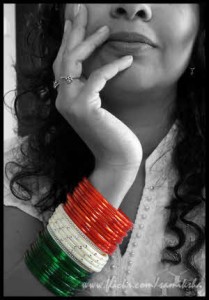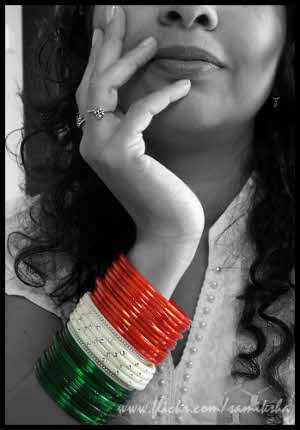by Meera Sundararajan
[box]What are the expectations from a married woman in India? Meera Sundararajan discusses the way married women and their responsibilities have been perceived over the years. Things have changed a bit, but there’s still a long way to go, she says. Read on.[/box]‘Sowbhagyawati Bhava’ or ‘May you be married’ is the oft repeated blessings for women and girls. In fact, marriage is something that girls in India are familiar with right from the time they are children. Financial planning for families revolves as much around a daughter’s marriage as buying a house or sending children to college does. As a girl grows into a woman, the parental frenzy to get her married increases. Many women themselves feel the pressure when peers start getting married and crossing over into the land of “married women”, hoping to ‘live happily ever after’.
But the question is how happy is the ‘ever after’?
A woman’s expectation from a marriage is different for every generation. In my mother’s time, a girl wanted to get married into a family which did not burden her with too many difficult family members or too much of work. These expectations came at a time when joint families were the norm and couples considered it their duty to be sons and daughters-in-law first, before being man and wife. Any display of closeness or affection between the couple, especially in the presence of elders, was frowned upon. Of course, women were expected to ‘obey’ the in-laws, husband and all elders. Giving birth to a male child was seen as a way of upgrading her status in the family hierarchy. Good culinary skills and ability to negotiate her way through the different relationships diplomatically were considered assets. Nobody really cared about what she wanted as long as she was able to deal effectively with what others wanted.
I once asked my mother what her favourite dish was. She found it difficult to answer this, though she rattled off the list of what the rest of us like to eat. When I persisted on knowing what her favourite food was, she closed the discussion by stating that her favourites were those dishes she found easiest to cook! It had never occurred to me till then that my mother, who I considered the best cook in the world, may actually find cooking a drudgery!
 Over the years, our society has changed and so have some of the expectations from women in a marriage. It seems to appear, superficially at least, that education is an important accomplishment that society looks for in a woman in marriage. But somehow, marriage still remains an institution mediated by power – with men holding most of it. If we look at the matrimonial columns in all leading newspapers, we can come across words like ‘fair, beautiful, domestically trained’ to describe the qualities expected of prospective brides. Over the years, other qualifications have crept in – for instance, being in the IT sector seems to be a desirable one, so is working in a public sector bank, or holding a H1B visa status in the U.S. The preference for the IT sector is probably more in South India because it is perceived as a ‘respectable’ knowledge industry that pays very highly with opportunities for that ultimate cross over across the seas into the land of “milk and honey” – the United States of America! Public sector banks are preferred again by more traditional families as they are seen to be offering job security and regular timings.
Over the years, our society has changed and so have some of the expectations from women in a marriage. It seems to appear, superficially at least, that education is an important accomplishment that society looks for in a woman in marriage. But somehow, marriage still remains an institution mediated by power – with men holding most of it. If we look at the matrimonial columns in all leading newspapers, we can come across words like ‘fair, beautiful, domestically trained’ to describe the qualities expected of prospective brides. Over the years, other qualifications have crept in – for instance, being in the IT sector seems to be a desirable one, so is working in a public sector bank, or holding a H1B visa status in the U.S. The preference for the IT sector is probably more in South India because it is perceived as a ‘respectable’ knowledge industry that pays very highly with opportunities for that ultimate cross over across the seas into the land of “milk and honey” – the United States of America! Public sector banks are preferred again by more traditional families as they are seen to be offering job security and regular timings.
To my understanding, it appears that many families want a bride who is employed in the best paying sector so that more income comes into the household. They also want someone who is good looking and understands the traditional expectations of her. So what is it that is new? How much has all this education and employment changed married life for the average Indian woman?
It does seem a bit unfair to me that we do not easily accept the fact that with increasing education and external exposure, a woman’s expectations from marriage and her partner might also have undergone some change. Today, a woman’s skills are showcased on a wider canvas. She also has more confidence to take decisions. But those age-old expectations from her still linger. If there is a need to take a day off because a child is ill or some relatives have shown up unexpectedly, it is still expected of the wife to do it. For women, it is a very difficult time. While we grow as individuals excelling in our career, we also face the frustration of not being able to realize our full potential as we take breaks for maternity, give up lucrative promotions because it means relocation. After a while, we wonder whose life it is that we are living – ours or that of our mothers? The point is that our mothers never had these contradictions to deal with in the first place!
Over the years, with increasing ‘nuclear-isation’ of families, we find that the social support system that joint families provided is breaking down. This calls for greater need for a husband and wife to shoulder responsibilities jointly as also to interact and invest in the relationship. These “relationship nurturing” skills are something that are fast becoming obsolete. With nearly eight hours of the day being spent by most couples outside the home with others, their ability to interact with each other and stay connected probably becomes somewhat of a challenge. My own analysis is that in many marriages, couples drift apart mainly because of this. From the woman’s perspective, I can say that women often relate better to a male colleague not only because they may spend more time with him than with the husband but the fact that the terms of the relationship are more egalitarian than that of a marriage which has nuanced elements of power lodged within it. This is particularly so with women who have had limited interactions with the opposite sex prior to their marriage.
For a society like ours where marriages are more like business deals and mergers between families, the role of a relationships manager has always fallen on women. The question is, do we want to be that? For instance, I would rather not have anything to do with a relative who is rude to me than just pander to him/her because of their “in-law” status. Some husbands understand that while many do not.
There is also what I call the new external influence in our lives in the form of the media. We see these advertisements where there are beautiful women who manage careers, children, in-laws and keep a great house. These also serve to reinforce the stereotypes that women have to shoulder the innumerable responsibilities of a marriage. We women strive to live such lives, working ourselves into a schizophrenic existence!
Somewhere along the way, the institution of marriage in our country needs to evolve to factor these changes in. I see some of it happening already, but it will probably take its time. Until then, women will continue to be expert acrobats walking that tight rope called marriage, balancing what we are with what we are expected to be.
Pic : Nisha A – http://www.flickr.com/photos/samiksha/
Meera Sundararajan works for what she calls the “change marketing” sector, otherwise known as the NGO sector. She has been “selling change” for nearly two decades now. Like most Indian women, she enjoys multiple identities – wife, mother, daughter, daughter- in- law, aunt; but unfortunately, none of these roles run true to type! She speaks five Indian languages fluently and also exhibits the sub-regional eccentricities that go with these languages. she loves reading and inflicting on others what she writes.
[button link=”https://sparkthemagazine.com/wp-content/uploads/2011/07/Spark-July-2011.pdf” color=”pink”] Click here to download the July issue as a colourful PDF![/button] [button link=”http://issuu.com/sparkeditor/docs/spark-july-2011?mode=embed&layout=http%3A%2F%2Fskin.issuu.com%2Fv%2Fcolor%2Flayout.xml&backgroundColor=000000&showFlipBtn=true”] Click here to read the July issue on the e-reader![/button] [retweet]Tweet[/retweet] [facebook]Share[/facebook]





